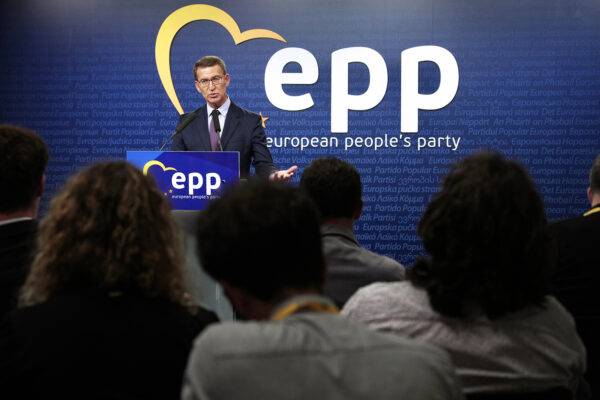
Polls predict the conservative People’s Party (PP) will win the election in Spain this month. But with 31 to 37 percent of the votes, it would fall well short of a majority.
Leader Alberto Núñez Feijóo has said he would first seek the acquiescence of the outgoing Socialist Party, which is polling at 27 to 29 percent, to form a minority government. That may be an option if Prime Minister Pedro Sánchez resigns or is forced out as leader. The centrist wing of his party never warmed to his coalition with the Basque and Catalan separatists and far left.
If the Socialists vote against him, Feijóo would need the support of Vox (Voice). The far-right party rules several Spanish regions and municipalities with the PP.
What would a minority PP government look like? And what might a deal with Vox entail? First I’ll list the highlights from the two parties’ election programs, then some of the concessions the PP has made to Vox in the regions.
What the PP wants
- Reduce the debt.
Spain’s national debt has grown from 100 percent of GPD in 2018, the year Sánchez came to power, to 113 percent. Although that is down from a high of 120 percent in 2020, when the economy shrank 11 percent and the government borrowed money to cushion the effects of COVID-19.
- Temporarily reduce sales tax on meat, fish and canned food.
- Leniency for taxpayers who made errors in their filings.
- Abolish the wealth tax.
- Reduce tax on incomes under €40,000.
Sánchez lowered tax on incomes under €200,000 from 27 to 26 percent, and on incomes up to €300,000 from 28 to 26 percent. He raised taxes on capital gains and Spain’s largest corporations.
- Abolish special taxes on banks and energy companies.
Sánchez raised taxes on banks by €1.5 billion and large energy companies by €2 billion.
- Raise tax on renewable energy.
Sánchez abolished the tax on solar panels the previous PP government introduced in 2015.
- Allow speedy evictions of squatters.
Sánchez banned evictions during the pandemic. A new law prohibits evictions if it would cause renters to become homeless.
- Abolish the law allowing gender changes at 16 without a parent’s approval.
Feijóo believes it shouldn’t be “easier to legally change your gender than it is to get your driver’s license.”
- Repeal a new law on sexual assault.
Dubbed “only yes means yes,” the new law expands the definition of rape. But it also lowered minimum prison sentences for sexual assault committed without violence, resulting in some 1,000 convictions being overturned.
- Restore the crime of sedition.
Nine Catalan leaders, including seven former regional ministers, were convicted of sedition in 2019 for organizing an illegal independence referendum in 2017. Their prison sentences ranged from nine to thirteen years. Sánchez — who relies on the support of one of Catalonia’s two major independence parties for a majority in Congress — pardoned the prisoners and abolished sedition as a crime, making Spain one of the last European countries to do so.
- Reform the law on euthanasia.
It’s unclear if the PP would outright recriminalize assisted suicide, but they voted against its legalization.
On average twenty Spaniards are euthanized each month, or seven out of every 10,000 deaths. The process, from request to death, typically takes between five and six weeks.
- 50-50 percent use of Spanish (Castilian) and regional languages in schools of bilingual regions.
Catalan primary and secondary schools teach mostly in Catalan.
What Vox wants
- Lower tax on incomes under €70,000 to 15 percent and tax on higher incomes to 25 percent.
- Cut spending in regional governments.
Spain consists of seventeen regions with varying degrees of autonomy. Vox would harmonize their rights, which would mean a significant loss of power for the Basque Country and Catalonia.
- Recriminalize abortion.
- Protect the food industry from animal-rights and environmental legislation.
The Socialists passed a law declaring animals “sentiment beings” and required cameras in all slaughterhouses.
Right-wing deals
In the officially bilingual Balearic Islands, off the east coast of Catalonia, Vox abstained from a confidence vote in the regional parliament to allow the PP to form a minority government. As part of the deal, civil servants will no longer be required to speak Catalan.
In Valencia, the two parties agreed to avoid all mention of gender-based violence and gay rights. Vox opposed a law raising penalties for men who beat or kill their wive or girlfriend. In the municipalities of Náquera and Torrijos, they banned rainbow flags.
